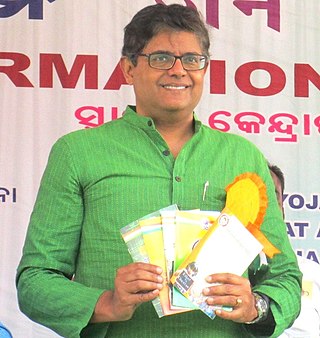A criminal code is a document that compiles all, or a significant amount of, a particular jurisdiction's criminal law. Typically a criminal code will contain offences that are recognised in the jurisdiction, penalties that might be imposed for these offences, and some general provisions.

The Indian Penal Code (IPC) was the official criminal code in the Republic of India, inherited from British India after independence, until it was replaced by Bharatiya Nyaya Sanhita in December 2023. It was a comprehensive code intended to cover all substantive aspects of criminal law. The code was drafted on the recommendations of the first Law Commission of India established in 1834 under the Charter Act of 1833 under the chairmanship of Lord Thomas Babington Macaulay. It came into force on the subcontinent during the British rule in 1862. However, it did not apply automatically in the Princely states, which had their own courts and legal systems until the 1940s. The code has since been amended several times and is now supplemented by other criminal provisions.
Homosexuality in India is legally permitted and tolerated by the most of the traditional native philosophies of the nation, and legal rights continue to be advanced in mainstream politics and regional politics. Homosexual cohabitation is also legally permitted and comes with some legal protections and rights.
The Scheduled Castes and the Scheduled Tribes Act, 1989 was enacted by the Parliament of India to prevent atrocities and hate crimes against the scheduled castes and scheduled tribes. The Act is popularly known as the SC/ST Act, PoA, or simply the 'Atrocities Act'.

The Unlawful Activities (Prevention) Act is an Indian law aimed at prevention of unlawful activities associations in India. Its main objective was to make powers available for dealing with activities directed against the integrity and sovereignty of India. The most recent amendment of the law, the Unlawful Activities (Prevention) Amendment Act, 2019 has made it possible for the Union Government to designate individuals as terrorists without following any formal judicial process. UAPA is also known as the "Anti-terror law".

Amit Anil Chandra Shah is an Indian politician who is currently serving as the 31st Minister of Home Affairs since 2019 and the 1st Minister of Co-operation of India since 2021. He served as the 10th President of the Bharatiya Janata Party (BJP) from 2014 to 2020. He has also served as chairman of the National Democratic Alliance (NDA) since 2014. He was elected to the lower house of Parliament, Lok Sabha, in the 2019 Indian general elections from Gandhinagar. Earlier, he had been elected as a member of the upper house of Parliament, Rajya Sabha, from Gujarat from 2017 to 2019.

The Code of Criminal Procedure commonly called Criminal Procedure Code (CrPC) was the main legislation on procedure for administration of substantive criminal law in India. It was enacted in 1973 and came into force on 1 April 1974. It provides the machinery for the investigation of crime, apprehension of suspected criminals, collection of evidence, determination of guilt or innocence of the accused person and the determination of punishment of the guilty. It also deals with public nuisance, prevention of offences and maintenance of wife, child and parents.

Baijayant "Jay" Panda is an Indian politician. He is the national vice president and spokesperson of the Bharatiya Janata Party (BJP). He was a Member of Parliament in the 15th and 16th Lok Sabha from Kendrapara. He was also a Member of Parliament in the Rajya Sabha for two terms from 2000 to 2009.

The Criminal Law (Amendment) Act, 2013 is an Indian legislation passed by the Lok Sabha on 19 March 2013, and by the Rajya Sabha on 21 March 2013, which provides for amendment of Indian Penal Code, Indian Evidence Act, and Code of Criminal Procedure, 1973 on laws related to sexual offences. The Bill received Presidential assent on 2 April 2013 and was deemed to be effective from 3 February 2013. It was originally an Ordinance promulgated by the President of India, Pranab Mukherjee, on 3 February 2013, in light of the protests in the 2012 Delhi gang rape case.

Members of the 16th Lok Sabha were elected during the 2014 Indian general election. The elections were conducted in 9 phases from 7 April 2014 to 12 May 2014 by the Election Commission of India. The results of the election were declared on 16 May 2014.

Ajay Mishra Teni is a politician and a Member of Parliament in the 17th Lok Sabha. He is the current Minister of State in Ministry of Home affairs, Government of India. He represents the Kheri constituency of Uttar Pradesh and is a member of the Bharatiya Janata Party political party.
Section 309 of the Indian Penal Code criminalises attempted suicide as well as suicide assistance.

The Motor Vehicles Act is an Act of the Parliament of India which regulates all aspects of road transport vehicles. The Act provides in detail the legislative provisions regarding licensing of drivers/conductors, registration of motor vehicles, control of motor vehicles through permits, special provisions relating to state transport undertakings, traffic regulation, insurance, liability, offences and penalties, etc. For exercising the legislative provisions of the Act, the Government of India made the Central Motor Vehicles Rules 1989.

Juvenile Justice Act, 2015 has been passed by Parliament of India amidst intense controversy, debate, and protest on many of its provisions by Child Rights fraternity. It replaced the Indian juvenile delinquency law, Juvenile Justice Act, 2000, and allows for juveniles in conflict with Law in the age group of 16–18, involved in Heinous Offences, to be tried as adults. The Act also sought to create a universally accessible adoption law for India, overtaking the Hindu Adoptions and Maintenance Act (1956) and the Guardians and Wards Act (1890), though not replacing them. The Act came into force from 15 January 2016.
The Real Estate Act, 2016 is an Act of the Parliament of India which seeks to protect home-buyers as well as help boost investments in the real estate industry. The Act establishes a Real Estate Regulatory Authority (RERA) in each state for regulation of the real estate sector and also acts as an adjudicating body for speedy dispute resolution. The bill was passed by the Rajya Sabha on 10 March 2016 and by the Lok Sabha on 15 March 2016. The Act came into force on 1 May 2016 with 61 of 92 sections notified. The remaining provisions came into force on 1 May 2017. The Central and state governments are liable to notify the Rules under the Act within a statutory period of six months.
The Transgender Persons Act, 2019 is an act of the Parliament of India with the objective to provide for protection of rights of transgender people, their welfare, and other related matters. The act was introduced in the Lok Sabha, the lower house of the Parliament, on 19 July 2019 by the Minister of Social Justice and Empowerment, Thawar Chand Gehlot, in light of the lapse of the Transgender Persons Bill, 2018. The 2019 act and the immediately preceding 2018 bill, were both preceded by a 2016 version. They were met with protests and criticism by some transgender people, lawyers, and activists in India. The 2016 bill was sent to a standing committee which submitted its report in July 2017. Following this, the Lok Sabha tabled and passed a newer version of the bill in December 2018. However, it did not incorporate many of the committee's recommendations. Although members of the opposition criticised the 2019 act and assured activists that they would not vote in favour of it, it was passed by the Lok Sabha on 5 August 2019 and by the Rajya Sabha, the upper house of the Parliament, on 26 November 2019. The president assented to it on 5 December 2019, upon which the act was published in the Gazette of India. It has been in effect since 10 January 2020 following a notification of the same in the Gazette on the same day.
Special Protection Group (Amendment) Act, 2019 is an act passed by Indian parliament in 2019 which reduces Special Protection Group cover to only Prime Minister, former Prime Minister and their immediate family members up to 5 years after ceasing post if they are residing at the residence allotted. The bill amends Special Protection Group Act 1988 which was in application.
The Bharatiya Nagarik Suraksha Sanhita, is the main legislation on procedure for administration of substantive criminal law in India.
The Bharatiya Sakshya Act, 2023 is an Act of the Parliament of India.








